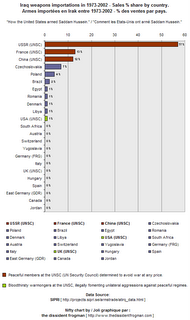On Net Neutrality
Like most other people both within and outside of the technology industry, I have slowly become cognizant of “Net Neutrality.” From talking with nameless faceless voices across the “innernets,” I have come to gather the sense that most geeks are in favor of it and think we really need it badly.
This is curious. I’m a geek myself. A geek may be hardcore right-wing or hardcore left-wing, but as a geek, he is not motivated by political movements. His geek desires are motivated purely by anecdotes. A wise, experienced geek may have worked in all kinds of environments, perhaps consulted, or perhaps worked in development on the cutting-edge of some technology, and have some personal knowledge that Novell is dead-and-buried or that USB is the way to go. Anecdotes, divulged or not, determine everything. Likewise, a foolish geek may push for something, and commit the sin of forming his preferences on far too narrow a range of experiences — but they’re still experiences. They’re anecdotal.
I would say it is not too far off the mark, to uphold this as the definition of a geek. Preferences borne from anecdotes. And so this was a red flag, albeit just a tiny one: Geeks say “we need Net Neutrality” the same way geeks say “we need Bluetooth.” Where are the anecdotes? Now to be fair, it’s not out of the ordinary that an anecdote may be important, without my hearing about it. It’s commonplace. Geeks don’t go around talking about all the problems their network had with Layer 2 collisions, which would have been avoided if they had used Token-Ring instead of Ethernet. Contrary to popular belief, we’d much rather talk about that funny thing John Stewart said on his program the other night, just like anyone else.
But consider what the anecdotes about Net Neutrality would be. Just consider this. I’m a geek, I think we need Net Neutrality, and I have an anecdote. That means I, or someone I know, surfed the “innernets” and couldn’t get somewhere. I, or the other person, chalked it up to a server being down, or a router being down, for a few days, and then come to find out the evil corporation that owned my ISP, was blocking me. And as a somewhat responsible geek, I have proof.
Now, what topic of conversation would be more enticing and stimulating, than an anecdote like that?
So in a brave new digital world swimming in proponents of Net Neutrality, proponents who are supposed to be geeks, I would expect to see us also swimming in anecdotes. Not just one or two. Hundreds. Thousands. Hundreds of thousands.
I’m told “we need Net Neutrality.” Consider the hypothetical that we need, and we lack, “road neutrality.” Roads are paved by private corporations instead of by the federal government, state departments of transportation, and county agencies. Private corporations do everything. Consider the idea that these private corporations drag their heels about laying down asphalt leading to places the corporations don’t want people to go.
How many anecdotes would we have, about people not getting to places they want to go? Great googely moogely, there’d be millions every year. Old people would talk about it, the way old people talk about strip malls right now. And the damn kids who won’t stay off my lawn.
Yet here we are, “needing Net Neutrality,” and we have no such thing.
Red flag number two is the notion that technology, by offering us options that we did not previously have, creates a need for legislation that would have been previously moot. This is not unprecedented by any means. People must weigh their own pesonal scruples against what RU-486 does, and should they find said scruples violated, we have a problem with the clash between public policy and personal ethics. Some do feel so violated, and so we do have the clash. Embryonic stem cell research is another example. The sprawling nature of civilization itself, creates all kinds of ethical conundrums. If Township X was inhabited by Bambi, his mom, and all their friends, then what right has man to encroach? The list goes on and on.
When people desire legislation where none had previously existed, citing dilemmas presented by technology that, similarly, had not previously existed, the sincere activist wants something out-and-out banned. It may be a narrow prohibition or it may be a sweeping one. But he is able to point to something being done, which he wants to not have done anymore.
In the case of Net Neutrality, that is supposed to be “discrimination.” This has the distinctive effect of not actually banning anything, but rather transferring the technology from the private sector which brought the technology into being in the first place, into the public sector. Hmmm. You know, that’s not unprecedented either. But history presents a dearth of good results blossoming forward from such a thing.
That’s Red Flag #2. But I chalked this up to being a red flag against NN being a good idea, rather than a red flag against the sincerity of the NN movement.
Red Flag #3 was not long in coming, and this one ran against the sincerity. It was a one-liner from that not-quite-official source, Wikipedia.
In April 2006 a large coalition[4] of political bloggers and citizen/consumer-oriented lobbying groups such as Free Press and MoveOn created Save The Internet, a political-action lobby endorsing network neutrality regulations.
Now, it’s possible MoveOn could be involved in something that has beneficial ramifications for everybody, not just left-wingers. It’s possible. Personally, I doubt this. MoveOn was formed for the purpose of keeping a Democrat from being thrown out of office, and that is their mission. They get Democrats into office, and get Republicans out. Making the “innernets” into a better communication medium, would be a bunny-trail for them, a poorly advised one, unless they needed the net to be a better medium so they could get a Democrat elected.
No, this is about creating a climate for more regulation. And that’s something that a “coalition of bloggers” wouldn’t want, not if they knew what they were doing — a government that can more easily regulate ISPs, can certainly more easily regulate the consumers of those ISPs. It’s the camel’s nose in the tent. You’re worried about typing “Hate America” into a search engine on a Monday evening, and having the FBI show up at your door Tuesday morning. If the government can tell the ISPs how to shovel bits around, then start worrying about your search engine phrases — in spades.
Anyway, those are my thoughts about Net Neutrality. I’m deeply suspicious because while the concept is a good one, the movement is not about the concept, it’s about the regulation that would enshrine the concept into law. It’s an insincere movement. And the movement doesn’t behave the way a sincere movement would. Not when the movement rising up standing on the shoulders of The Geek.
Not that MoveOn can’t support a sincere movement. But the honest advocate would have provided that in fair disclosure, so that all recruits to the movement would have known who their new bedfellow was. It’s just the honest thing to do.
What is written above captures most of my thoughts, where they come from, and where they’re going, although I do have some basic conceptual stuff I’ll discuss further down. What is written below, excerpts what others have to say.
Wall Street Journal has a great op-ed on the subject…which, it seems at first, provides the anecdote for which I was seeking. But you better keep reading…
A Net Loser
Google and Moveon.org say they want to help you. Look out.
Saturday, June 24, 2006 12:01 a.m. EDT
Chances are that by now readers have heard the term “Net neutrality,” even if they haven’t figured out what all the fuss is about. This week, the controversy reached the Senate, with Net neutrality proponents attempting to write a whole new layer of Internet regulation into law. Support for regulation of the Internet is also looking more and more like a litmus test for Democratic Presidential hopefuls.
A recent incident may illuminate the controversy for those wondering what both sides are after. Several weeks ago, users of Cox Communications’ broadband Internet service found that they could no longer access Craigslist.org, the free classifieds site. Some bloggers immediately smelled a rat–Cox’s parent company also owns newspapers, which compete with Craigslist for classified ads.
In a letter to this newspaper last week, Senator Ron Wyden (D., Oregon) cited the Cox incident as an example of why we need Net neutrality rules. Without them, supposedly, Verizon, Comcast, Cox and other Internet access companies would control users’ Internet experience to the detriment of consumers.
Well, not quite. It turns out Cox had installed another company’s security software to protect its users, and a bug in that software inadvertently cut users off from Craigslist. But don’t take our word for it. Craigslist founder Craig Newmark, no enemy of Net neutrality, said this about the incident on his blog: “The whole thing was exacerbated by folks talking about Net neutrality,” adding for good measure: “None of this was deliberate” by Cox.
I’m going back to Red Flag #1. Let’s have an anecdote that actually pans out. Let’s have tens of thousands of them, before we even think about inviting the heavy hand of regulation into this corner of our lives, where freedom has given us so much.
 Is there anything you can find so much good to say about, as what you can find to say about the Internet? Try to think of something. You can’t. Oh, sure, you can find some old prudes who don’t quite understand it, and are suspicious of it, and have sinister things they heard about children abducted by their brand-new “chat room” pals. There are wives who have left their husbands because of some guy they met over the Internet. There is credit card fraud and theft of personal information, made possible by the Internet.
Is there anything you can find so much good to say about, as what you can find to say about the Internet? Try to think of something. You can’t. Oh, sure, you can find some old prudes who don’t quite understand it, and are suspicious of it, and have sinister things they heard about children abducted by their brand-new “chat room” pals. There are wives who have left their husbands because of some guy they met over the Internet. There is credit card fraud and theft of personal information, made possible by the Internet.
And yet, such evils serve to demonize the new technology only in the most awkward, logically unworkable ways. No sane man can stand on the soapbox of logic and common-sense, and propose that the new communication medium be stymied to keep the children from being abducted, to keep the treacherous wives with their husbands, to keep the credit card numbers and social security numbers safe. This would be sheer lunacy. The child would still have the habit of recklessly engaging strangers, the wife would still be an unfaithful whore, those tasked with responsible stewardship of the personal information, would remain habitually negligent. Reckless, unfaithful, negligent…and undetected.
And so, the Net is good. It is not “Net Good,” as no benefit can offset the profound tragedy of a trusting child being carted off somewhere by a pervert, and chopped up into bits. It is, I submit, “Gross Good,” because I place responsibility for such tragedy on the human element, not on technology. The technology is nothing but better communication, an increased capacity for searching out those amongst us who share our interests. History is mute on any benefit arising from the suppression of such a thing, and the Internet specializes in nourishing it.
The Internet’s mother is technology…and it’s father is freedom. Freedom, that thing we all say we want, although very few of us really seem to. Those who love government and regulation and nanny-state rules, are now saying the Internet should go and live with them. They presume, I guess, that the Internet has reached majority age and is ready to be transplanted. They already say the Internet is an out-of-wedlock bastard conception of that studly back-door man Al Gore. Now, it appears they think parentage should be subjected to a vote.
But freedom is the real father. You can tell. The Internet has it’s father’s eyes.
 We don’t discuss just politics here. Over in the sidebar you will see “Building A Timberframe Home,” as in, “From Scratch.” This guy over in Kentucky, he’s blogging about building his house. He’s been doing it since 2003.
We don’t discuss just politics here. Over in the sidebar you will see “Building A Timberframe Home,” as in, “From Scratch.” This guy over in Kentucky, he’s blogging about building his house. He’s been doing it since 2003.











 So I’m calling this “titties and terrorists.” The subject of titties comes up, and the subject of terrorism comes up. And, before you wait too long, people are lending their good names to complete and utter bullshit — not utility-grade bullshit, but the premium, ultra-high-Nitrogen-content bullshit. We can’t have a family-friendly sports bar in my neighborhood, because the waitresses wear little orange shorts. We must pass a global test before we do anything about terrorists. Your wall calendar is oppressing me. “Waterboarding” is torture. The jokes created a hostile work environment. Saddam Hussein was no threat. Women are not for decoration. Blah blah blah…crap, crap, crap. An endless stream of crap dribbling out of people’s mouths. Makes you want to take a shower when you’re done listening to them.
So I’m calling this “titties and terrorists.” The subject of titties comes up, and the subject of terrorism comes up. And, before you wait too long, people are lending their good names to complete and utter bullshit — not utility-grade bullshit, but the premium, ultra-high-Nitrogen-content bullshit. We can’t have a family-friendly sports bar in my neighborhood, because the waitresses wear little orange shorts. We must pass a global test before we do anything about terrorists. Your wall calendar is oppressing me. “Waterboarding” is torture. The jokes created a hostile work environment. Saddam Hussein was no threat. Women are not for decoration. Blah blah blah…crap, crap, crap. An endless stream of crap dribbling out of people’s mouths. Makes you want to take a shower when you’re done listening to them.












